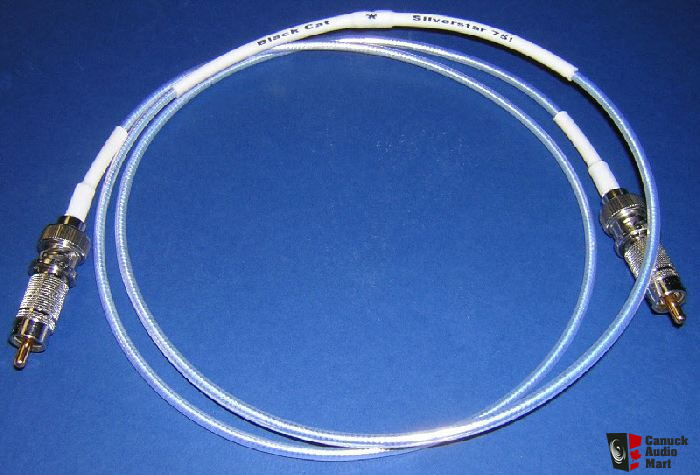Post by MartinT on Jun 16, 2018 23:34:21 GMT
The Silverstar is an unusually thin cable with a metal foil shield and a protective transparent plastic sleeve. It's a 75 ohm digital audio cable with BNC connectors at either end, and comes complete with BNC to phono adapters. Having done some reading on Black Cat and its founder Chris Sommovigo, I got interested in trying one out. Let's just say that his reputation precedes him and it's pretty good.

There wasn't much to do except swap it in place of my usual Belden 1694A cable between Pi/DigiOne transporter (BNC) and Caiman SEG DAC (phono) and leave it running for a while. This is important as I heard it settle and lose its edge over the next few hours before serious listening. Even now, with some 30 hours of running, it's still getting smoother.
With digital cables it's hard to know what to expect, especially in my case with re-clocking going on both ends. The digital cable shouldn't make much difference but the reality is that they all sound different. The Silverstar's first surprise is the wealth of fine detail in the presentation. The second is how it separates voices, especially backing vocals, and makes them more individually real rather than homogeneous. If the Belden is a neutral standard then the Silverstar is just a touch more brightly lit but with the same essential balance of attributes. It certainly brings more fine detail cues into focus. Playing Ry Cooder's excellent Paradise and Lunch album, for instance, brings up the guitar picking and really sheds light on the guitar's character.
This cable is no longer in production and has been replaced by the Mk.II. If you can find it for under £100 as I did, it's a bit of a bargain and certainly betters the Belden, QED and Gotham cables I have in my collection.
Black Cat Cable

There wasn't much to do except swap it in place of my usual Belden 1694A cable between Pi/DigiOne transporter (BNC) and Caiman SEG DAC (phono) and leave it running for a while. This is important as I heard it settle and lose its edge over the next few hours before serious listening. Even now, with some 30 hours of running, it's still getting smoother.
With digital cables it's hard to know what to expect, especially in my case with re-clocking going on both ends. The digital cable shouldn't make much difference but the reality is that they all sound different. The Silverstar's first surprise is the wealth of fine detail in the presentation. The second is how it separates voices, especially backing vocals, and makes them more individually real rather than homogeneous. If the Belden is a neutral standard then the Silverstar is just a touch more brightly lit but with the same essential balance of attributes. It certainly brings more fine detail cues into focus. Playing Ry Cooder's excellent Paradise and Lunch album, for instance, brings up the guitar picking and really sheds light on the guitar's character.
This cable is no longer in production and has been replaced by the Mk.II. If you can find it for under £100 as I did, it's a bit of a bargain and certainly betters the Belden, QED and Gotham cables I have in my collection.
Black Cat Cable










